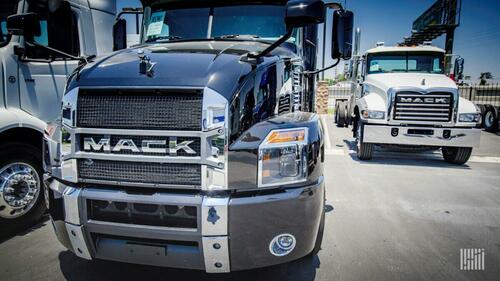
By Alan Adler of FreightWaves
How did the biggest contract offer Mack Trucks ever tendered its United Auto Workers-represented employees get trashed and result in a strike?
Two catalysts may be responsible.
-
One is the so-called rank-and-file committees, workers who claim socialism as their mantra. Through the World Socialist Web Site (WSWS), they regularly attack union leaders at the local and international levels. They call them toadies for management who bring secretly negotiated, substandard contracts to members incentivized with a signing bonus.
-
The other is the ongoing UAW strike at the Detroit Three automakers. For the first time, the UAW simultaneously targeted all three companies — General Motors, Ford and Stellantis. It has targeted specific plants to strike, so far avoiding hugely profitable pickup truck plants. About 17%, or 25,000, of 146,000 UAW members are currently on strike.
Watching the UAW strike in Detroit
Goaded into striking or not, Mack workers are watching the Detroit negotiations. They hope for a contract similar to what is eventually reached.
The UAW claims significant gains in negotiations since the autoworkers’ strike began Sept. 15. The union twice expanded the strike against specific companies. On Friday, it decided against another widening because GM conceded to extend the UAW master agreement to its battery plants. Several of those plants have yet to hire workers.
The union has expressed concern that electric vehicles (EVs) the companies are pursuing will threaten job security. EVs have fewer parts and require less assembly time than internal combustion engines.
Mack builds a small number of electric trucks at its plant in Lower Macungie in Pennsylvania’s Lehigh Valley. The company is planning an electric version of its medium-duty MD Series. Internal combustion engine versions of those trucks are built at a nonunion plant in Roanoke, Virginia.
Volvo Group workers at parts distribution centers in Jacksonville, Florida, and Baltimore are on strike. So is an engine plant in Hagerstown, Maryland, that makes powertrains for Volvo and Mack Trucks. Mack is a part of Volvo Group North America, the only truck maker that builds all its North American products in the U.S.
UAW demands COLA increases and end of 2-tier wages
UAW President Shawn Fain has said Ford and Stellantis have agreed to restart a cost-of-living-adjustment (COLA) formula that the union conceded in 2009 during the Great Recession. The union also is determined to end dual-tier wages in which new workers are hired below the wage of existing workers. The UAW agreed to two-tier wages in 2007.
Neither COLA nor two-tier wages were addressed in the tentative agreement at Mack, which the WSWS has pointed out repeatedly.
“Inflation is up 22% in the last 3yrs. This contract we’re getting a 19% raise but over 5 yrs,” the WSWS posted on X, formerly Twitter.
The tentative agreement was rejected Sunday by 73% of workers who voted. The tentative local agreement for the Mack assembly plant would have added 30 minutes to the workday with workers earning an average of $3,000 more a year before master contract economics. The WSWS said that extra work should be paid at overtime rates.
“The UAW called our tentative agreement ‘a record contract for the Heavy Truck industry,’ and we trust that other stakeholders also appreciate that our market, business, and competitive set are very different from those of the passenger car makers,” Mack President Stephen Roy said in a news release.
The auto industry collectively builds millions of vehicles in the U.S. every year compared with trucking, which produces several hundred thousand vehicles annually. Both industries are cyclical. Automakers mostly sell to franchised dealers that target individual consumers. Truck manufacturers work directly with fleets and deliver products through dealers.
The Lehman factor
Mack worker Will Lehman, who ran against Fain for the UAW International presidency earlier this year, addressed workers at a contract review meeting on Saturday, calling for greater transparency in contract negotiations.
Lehman unsuccessfully sued to halt the runoff that Fain won over incumbent President Ray Curry in May. He denounced Fain for “acting like he stands with us” after having “tried to ram through a pay cut, sellout tentative agreement on the workers at Mack Trucks.”
“This is the kind of contract that gets negotiated behind closed doors,” Lehman told workers gathered in Bethlehem, Pennsylvania, on Saturday. “There needs to be full transparency to all the workers, and as far as the vote count goes that needs to be made transparent to the workers as well.”
Labor leaders urging passage of tentative agreements carry less weight among workers than they have historically. UAW workers at Mack sibling Volvo Truck North America (VTNA) rejected three tentative agreements in 2021 before Volvo put terms of its final offer into effect after a split vote on the third offer.
Now Mack appears to be following that play and castigating local bargainers and the company for trying to buy labor peace with a $3,500 signing bonus.
The WSWS accused Mack of seeking a five-year agreement so future bargaining would be out of sync with the expiration of automaker contracts that expire after four years. In 2019, Mack workers struck for 12 days while the UAW was on strike against GM. There’s no evidence the Mack settlement was influenced by the GM strike.
By Alan Adler of FreightWaves
How did the biggest contract offer Mack Trucks ever tendered its United Auto Workers-represented employees get trashed and result in a strike?
Two catalysts may be responsible.
-
One is the so-called rank-and-file committees, workers who claim socialism as their mantra. Through the World Socialist Web Site (WSWS), they regularly attack union leaders at the local and international levels. They call them toadies for management who bring secretly negotiated, substandard contracts to members incentivized with a signing bonus.
-
The other is the ongoing UAW strike at the Detroit Three automakers. For the first time, the UAW simultaneously targeted all three companies — General Motors, Ford and Stellantis. It has targeted specific plants to strike, so far avoiding hugely profitable pickup truck plants. About 17%, or 25,000, of 146,000 UAW members are currently on strike.
Watching the UAW strike in Detroit
Goaded into striking or not, Mack workers are watching the Detroit negotiations. They hope for a contract similar to what is eventually reached.
The UAW claims significant gains in negotiations since the autoworkers’ strike began Sept. 15. The union twice expanded the strike against specific companies. On Friday, it decided against another widening because GM conceded to extend the UAW master agreement to its battery plants. Several of those plants have yet to hire workers.
The union has expressed concern that electric vehicles (EVs) the companies are pursuing will threaten job security. EVs have fewer parts and require less assembly time than internal combustion engines.
Mack builds a small number of electric trucks at its plant in Lower Macungie in Pennsylvania’s Lehigh Valley. The company is planning an electric version of its medium-duty MD Series. Internal combustion engine versions of those trucks are built at a nonunion plant in Roanoke, Virginia.
Volvo Group workers at parts distribution centers in Jacksonville, Florida, and Baltimore are on strike. So is an engine plant in Hagerstown, Maryland, that makes powertrains for Volvo and Mack Trucks. Mack is a part of Volvo Group North America, the only truck maker that builds all its North American products in the U.S.
UAW demands COLA increases and end of 2-tier wages
UAW President Shawn Fain has said Ford and Stellantis have agreed to restart a cost-of-living-adjustment (COLA) formula that the union conceded in 2009 during the Great Recession. The union also is determined to end dual-tier wages in which new workers are hired below the wage of existing workers. The UAW agreed to two-tier wages in 2007.
Neither COLA nor two-tier wages were addressed in the tentative agreement at Mack, which the WSWS has pointed out repeatedly.
“Inflation is up 22% in the last 3yrs. This contract we’re getting a 19% raise but over 5 yrs,” the WSWS posted on X, formerly Twitter.
The tentative agreement was rejected Sunday by 73% of workers who voted. The tentative local agreement for the Mack assembly plant would have added 30 minutes to the workday with workers earning an average of $3,000 more a year before master contract economics. The WSWS said that extra work should be paid at overtime rates.
“The UAW called our tentative agreement ‘a record contract for the Heavy Truck industry,’ and we trust that other stakeholders also appreciate that our market, business, and competitive set are very different from those of the passenger car makers,” Mack President Stephen Roy said in a news release.
The auto industry collectively builds millions of vehicles in the U.S. every year compared with trucking, which produces several hundred thousand vehicles annually. Both industries are cyclical. Automakers mostly sell to franchised dealers that target individual consumers. Truck manufacturers work directly with fleets and deliver products through dealers.
The Lehman factor
Mack worker Will Lehman, who ran against Fain for the UAW International presidency earlier this year, addressed workers at a contract review meeting on Saturday, calling for greater transparency in contract negotiations.
Lehman unsuccessfully sued to halt the runoff that Fain won over incumbent President Ray Curry in May. He denounced Fain for “acting like he stands with us” after having “tried to ram through a pay cut, sellout tentative agreement on the workers at Mack Trucks.”
“This is the kind of contract that gets negotiated behind closed doors,” Lehman told workers gathered in Bethlehem, Pennsylvania, on Saturday. “There needs to be full transparency to all the workers, and as far as the vote count goes that needs to be made transparent to the workers as well.”
Labor leaders urging passage of tentative agreements carry less weight among workers than they have historically. UAW workers at Mack sibling Volvo Truck North America (VTNA) rejected three tentative agreements in 2021 before Volvo put terms of its final offer into effect after a split vote on the third offer.
Now Mack appears to be following that play and castigating local bargainers and the company for trying to buy labor peace with a $3,500 signing bonus.
The WSWS accused Mack of seeking a five-year agreement so future bargaining would be out of sync with the expiration of automaker contracts that expire after four years. In 2019, Mack workers struck for 12 days while the UAW was on strike against GM. There’s no evidence the Mack settlement was influenced by the GM strike.
Loading…






